Publications
Articles, publications, books, tools and multimedia features from the U.S. Institute of Peace provide the latest news, analysis, research findings, practitioner guides and reports, all related to the conflict zones and issues that are at the center of the Institute’s work to prevent and reduce violent conflict.
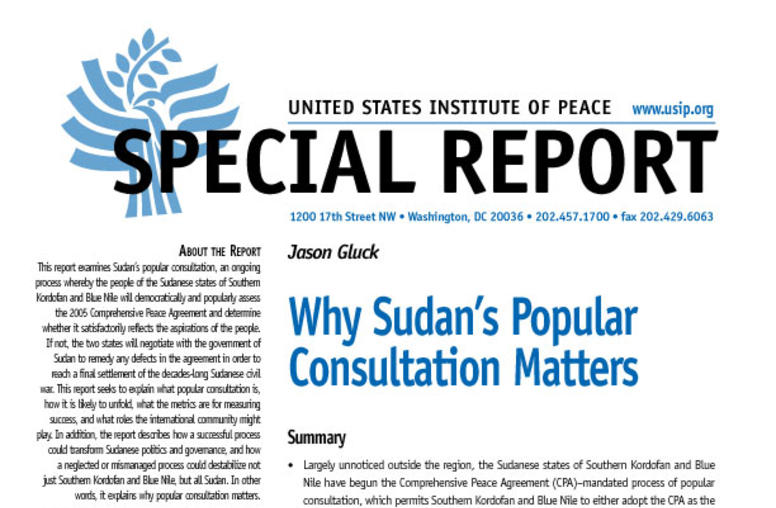
Why Sudan’s Popular Consultation Matters
This report examines Sudan’s popular consultation, an ongoing process whereby the people of the Sudanese states of Southern Kordofan and Blue Nile will democratically and popularly assess the 2005 Comprehensive Peace Agreement and determine whether it satisfactorily reflects the aspirations of the people.
On the Issues: Iraqi Parliamentary Minority Caucus
As Iraq continues the process of government formation after its March elections, USIP's Rule of Law Center of Innovation is working with Iraqi minority groups to protect and reinforce constitutional rights. In an effort to strengthen democracy and raise awareness of minority issues in Iraq, USIP has helped establish a parliamentary minority caucus. USIP Senior Rule of Law Adviser Jason Gluck, who recently returned from Iraq, describes the caucus and its goals.
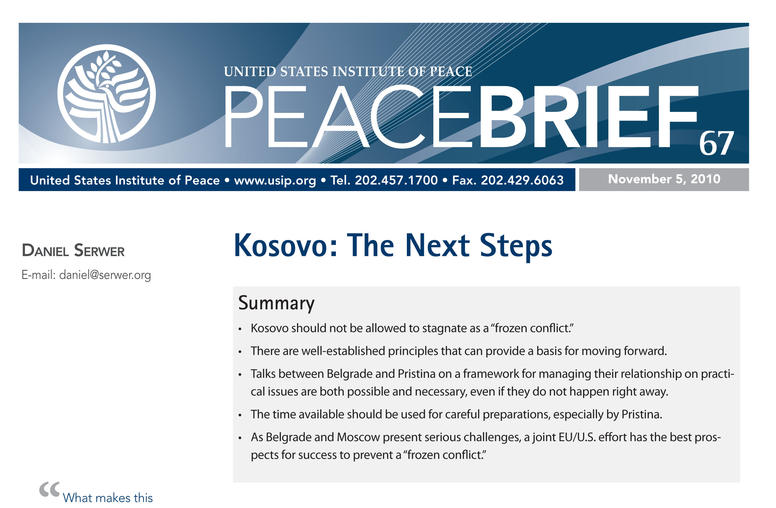
Kosovo: The Next Steps
A small group of experienced American Balkans hands met in October at the United States Institute of Peace in Washington, D.C. to discuss the situation and the way forward. This Peace Brief summarizes salient points from their discussion.
Former Haiti Prime Minister Says, “Haiti Must Build Back Better”
As Haiti struggles to recover from the devastating January earthquake, former Prime Minister Michèle Pierre-Louis said at an event at the United States Institute of Peace that in order for Haiti to build back better, the process must start within Haiti itself. The USIP event “Is Haiti Building Back Better?” held on October 29, 2010 focused on the challenges that have developed in the nine months since the January 12th earthquake.
Sports as a Metaphor and Tool for Peacebuilding
Sports speaks a language of its own that can be translated seamlessly from one culture to another, but often its impact is difficult to measure, said panelists at the United States Institute of Peace Sports and Peacebuilding Symposium.
Arab Hip Hop Artists Use Music to Collaborate on Peace
Rhymes and rhythms can share ideas across cultures, and that is just what the Arab Hip Hop artists at the event, “Rhymes of Peace: Arab Hip Hop Artists on Youth and Media,” emphasized through their performances and discussions at the United States Institute of Peace. The Narcicyst, along with hip hop artists Omar Offendum and Mana, participated in the forum.
USIP Board Member Emphasizes the Significance of Media in Peacebuilding Efforts
Media technology is changing the way peacework is done, and the United States Institute of Peace is leading the field, according to USIP Board of Directors vice chairman, George E. Moose.
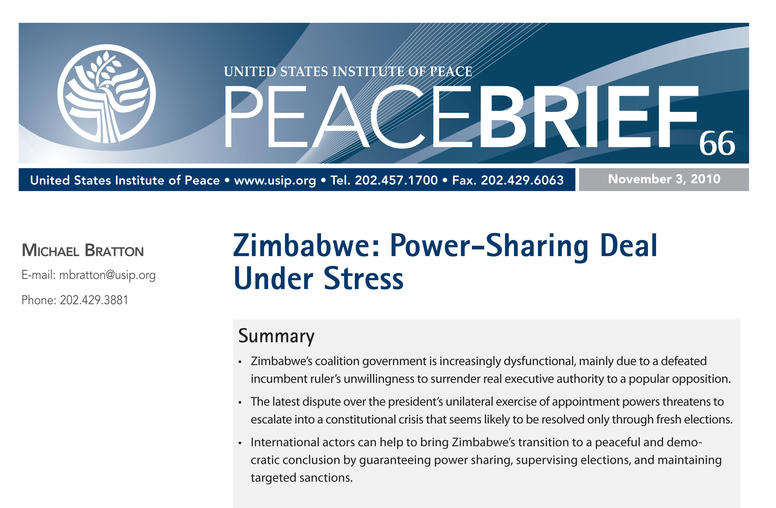
Zimbabwe: Power-Sharing Deal Under Stress
The fragile power-sharing deal between Zimbabwe’s political parties is close to breaking down. Michael Bratton, a Jennings Randolph senior fellow at the U.S. Institute of Peace, discusses the latest stalemate. This Peace Brief is based on press monitoring and interviews in Harare, Zimbabwe, Washington, D.C., and elsewhere between May and October 2010.
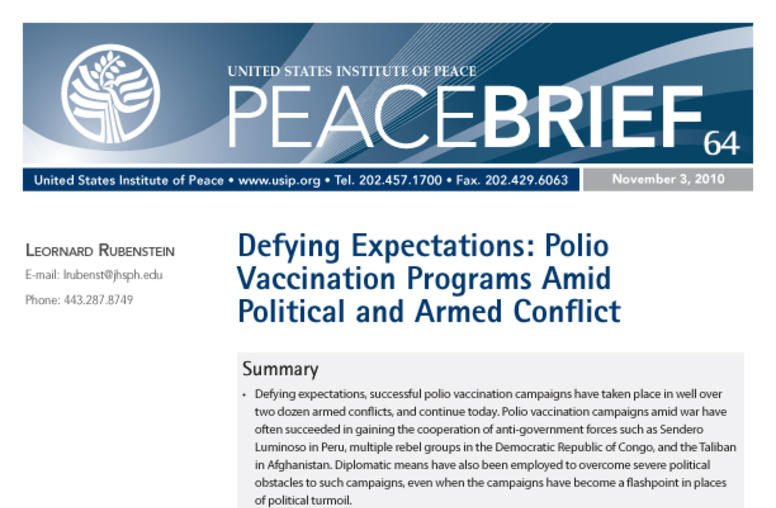
Defying Expectations: Polio Vaccination Programs Amid Political and Armed Conflict
This Peace Brief, based on a panel discussion convened by the U.S. Institute of Peace Health and Peacebuilding Working Group on June 29, 2010, was written by Leonard Rubenstein, coordinator of the USIP Working Group and a Senior Scientist at the Center for Public Health and Human Rights at the Johns Hopkins Bloomberg School of Public Health.
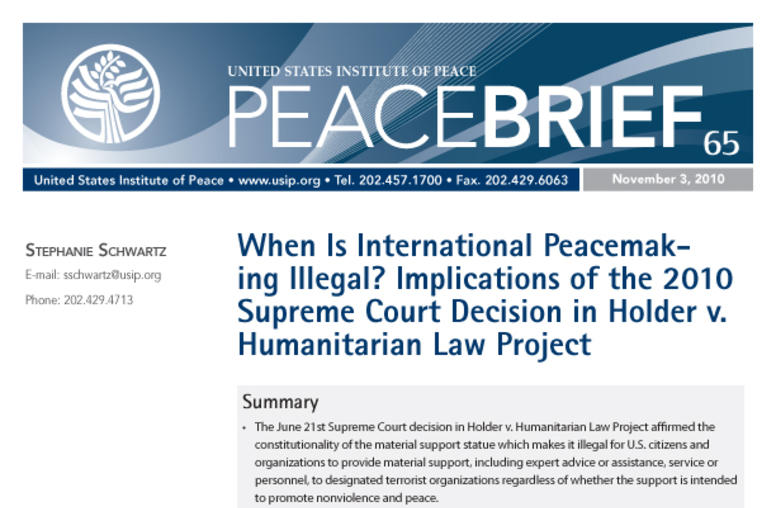
When Is International Peacemaking Illegal?
The June 2010 Supreme Court decision in Holder v. Humanitarian Law Project upheld the constitutionality of the material support law which makes it illegal for U.S. citizens and organizations to provide support, including expert advice and training, to designated terrorist organizations regardless of whether that support is intended to promote peace. This Peace Brief captures the discussion from a public event convened by the U.S. Institute of Peace on September 10, 2010.